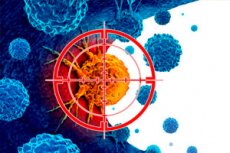New biomarker predicts immunotherapy success in kidney cancer
Last reviewed: 14.06.2024

All iLive content is medically reviewed or fact checked to ensure as much factual accuracy as possible.
We have strict sourcing guidelines and only link to reputable media sites, academic research institutions and, whenever possible, medically peer reviewed studies. Note that the numbers in parentheses ([1], [2], etc.) are clickable links to these studies.
If you feel that any of our content is inaccurate, out-of-date, or otherwise questionable, please select it and press Ctrl + Enter.

Immunotherapy increases survival in kidney cancer, but it is not suitable for all patients. A research team from Leuven has developed a new method to predict who will benefit from the treatment. A team led by Francesca Finotello from the Computational Biomedicine Group at the University of Innsbruck also contributed to the study.
Their work, published in the journal Nature Medicine, opens up new avenues for more effective treatment.
Each year in Austria, around 1,300 people are diagnosed with kidney cancer. Thanks to immunotherapy, survival rates for metastatic kidney cancer have increased significantly: more than half of patients survive more than five years after diagnosis, compared to 10% in the past. Unfortunately, the innovative treatment does not work for all patients.
To understand the reasons for this variation in the effectiveness of immunotherapy and to better predict who will benefit from treatment, the research team from Leuven conducted a large retrospective study. They analysed a large number of kidney cancer patient samples treated with immunotherapy at UZ Leuven over the past ten years.
Molecular signature Researcher and oncologist Dr Lisa Kinget and postdoc Stefan Naulaerts explain: “We examined both tumour biopsies and blood samples using cutting-edge laboratory techniques. Using machine learning, we combined gene expression in the tumour with hereditary characteristics of the patients’ immune system, in particular the HLA genes, which have hundreds of variations depending on the individual.
This approach allowed us to discover a ‘molecular signature’ that showed a clear link to clinical response and survival. We further confirmed this link in independent samples from over 1,000 kidney cancer patients from other international studies.”
Laboratory tests also showed that successful response to immunotherapy was associated with good interaction between two types of immune cells, namely CD8+ T cells and macrophages.
Dr Francesca Finotello from the Department of Molecular Biology of the University of Innsbruck and the Center for Digital Science (DiSC) adds: “We integrated and analyzed big data from The Cancer Genome Atlas (TCGA) project to link this new molecular signature to the mutational landscape of tumors, demonstrating that it provides additional information regarding the genetic background of cancer cells, effectively capturing their interaction with the immune system."
Professor Abhishek D. Garg from KU Leuven says: “Previously, researchers mainly studied immune cells at the level of individual cell types, which led to simplified biomarkers. As a result, we considered macrophages to be “bad” for immunotherapy. With this study, we show that interactions between different types of immune cells in a specific spatial context are more important in the fight against kidney cancer."
Professor Benoit Böselinck, medical oncologist at UZ Leuven, says: “In the future, we hope to use our method as a biomarker to predict which patients will benefit from immunotherapy. The new insight that the interaction between certain T cells and macrophages is important for the success of immunotherapy opens up interesting avenues for future treatments.
We are currently developing new clinical trials of combination therapies to stimulate both cell types and improve how they work together, which may be more effective than current treatments.
